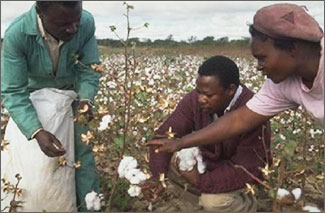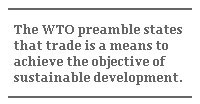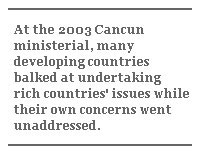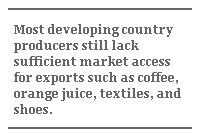How to Jump-Start the WTO
How to Jump-Start the WTO

WASHINGTON: Just a few months after the 9/11 attacks, members of the World Trade Organization met in Doha to kick off a new round of talks. In an emotionally charged atmosphere – wreckage of the World Trade Center and the Pentagon was still being cleared – the members promised to focus on the needs of developing countries. Four years have passed, and the WTO seems paralyzed. What happened?
For a brief moment, industrialized country policymakers appeared to consider trade as an option to stimulate growth in the developing world, and in turn, reduce support for and interest in terrorism. As the US Trade Representative Robert Zoellick stressed, "Fragile democracies …rely on the international economy to overcome poverty. ... [W]e need answers for those who ask for economic hope to counter internal threats to our common values." But industrialized country policymakers soon returned to business as usual; the problems of the developing world were far removed from their immediate political interests. The developing countries, meanwhile, put their collective feet down: Banding together, they agreed talks should not progress until they obtained greater market access for their goods.

In 1995, when the WTO was established, 134 member states explicitly acknowledged the need to do more to help developing countries reap the benefits of trade. The WTO preamble states that trade is a means to achieve the objective of sustainable development. Members promised to achieve that objective through negotiations, but until 2001, they could not even agree to talk. At Doha, they agreed to place the needs of developing countries at the heart of a new round. Alas, some four years later, these talks have stalled.
Critics of the WTO contend that the problem lies in the rules underpinning the organization. These rules were designed to ensure a fair process (certainty in trade) rather than specific results (such as development) for certain countries. Every member, industrialized or developing, must adhere to four fundamental principles: most-favored nation status, national treatment, reciprocity, and consensus. When applied, however, these rules may be particularly hard on developing countries. For example, the national treatment principle requires policymakers to apply the same rules and regulations to domestic and foreign producers. Thus, India must apply the same food safety regulations to Coca-Cola that it applies to Coke's local competitor. More difficult still is the reciprocity principle, wherein nations acceding to the WTO must commit to equivalent obligations as those undertaken already by the existing members. But some developing countries lack the adequate funding or expertise to bind their tariffs, modernize their customs system, ensure adequate intellectual property protection, and at the same time, provide other essential public services.

Members of the General Agreement on Tariffs and Trade (GATT, the WTO predecessor) were not blind to these difficulties. As developing countries began to join in ever greater numbers, they voiced their concerns. Member countries recognized the need to ensure that the system fostered, rather than undermined, development. In 1971, under a waiver of the most-favored nation principles, members established a discriminatory system of preferences to favor the trade of developing countries and to help them diversify their exports. Such preferences, as well as other rules-based "fixes," helped countries such as Brazil, Singapore, and Taiwan become major exporters, using trade to develop. Unfortunately, these "fixes" did not address the core problem: These countries lacked real access to developed country markets because many industrialized countries still maintained high effective trade barriers, or excluded specific products from such preferential treatment. The only way to change this situation was to make market access a key subject of negotiations.
In the Uruguay Round of trade talks (1986-1993), policymakers from around the world developed a grand bargain: Developing countries agreed to negotiate new sectors (services and intellectual property) in return for a commitment to bringing agriculture and textiles under the purview of the system of rules. This round also established the WTO as a formal international organization with a dispute settlement system designed to enforce market access rights.
The WTO and the Uruguay Round undoubtedly stimulated trade among members, but not all members benefited equally. According to a 2003 IMF working paper by Arvind Subramanian and Shang-Jin Wei, WTO rules have stimulated a large increase in imports (some 40 percent of world trade) for industrialized countries, but many developing countries – especially newer members – have seen few visible results.
The 9/11 attacks were a fresh reminder that poverty can breed conditions where terrorism flourishes, and that development is a better long-term guarantee for security than military action. Thus, when WTO members met at Doha, they promised to focus the negotiations on development and "commit … to the objective of duty-free, quota-free market access for products originating from [less developed countries]."

Nonetheless, many industrialized countries also insisted that any new round include some of their priorities such as negotiations on services, investment, and competition policies. But these were not sectors of key concern to many WTO members at a lower stage of development. At the 2003 ministerial in Cancun, many developing countries balked at undertaking rich countries' issues while their own concerns went unaddressed. To get the negotiations back on track in July 2004, WTO members agreed to limit the purview of the negotiations to five key areas: agriculture, industrial tariffs, trade facilitation, development issues, and services.
These five areas, however, comprise an exceedingly broad purview for negotiations – and, further, they are not centered on the concerns of the neediest WTO members. In order to re-start the talks, advanced industrialized countries would have to show their commitment to development by limiting the talks to two crucial sectors: agriculture and market access. Although agriculture is the principal sector of the developing countries, it has never been fully covered under GATT or WTO rules. Developing country producers cannot export to many industrialized countries because of high tariffs in certain key sectors or production standards that are not required in their home markets. Moreover, despite multiple rounds of trade talks, most developing country producers still do not have sufficient market access for exports such as coffee, orange juice, textiles, and shoes.

It will not be easy to conduct and get approval for a trade negotiation limited to agriculture and market access. Without direct and immediate benefits to their producers and consumers, industrialized country policymakers may fear they will not be able to sell a narrowly focused trade round to their legislatures. They must provide leadership in educating the broad public. If they do so, policymakers in the industrialized world may find their constituents surprisingly receptive. Many constituents now understand that the problems of poor nations (such as inadequate sanitation or public health) can travel across borders, affecting their lives. Many people in the industrialized world also recognize that developing country producers must export to be able to purchase goods from the industrialized world. By reducing protectionism in the industrialized world, they increase opportunities around the world.
Policymakers in the industrialized world must rethink their objectives for this round of trade talks. They promised a round focused on development; they must deliver on that promise – especially if they want future negotiations in newer sectors. The WTO will not work well for citizens in the industrialized world if the majority of its member nations believe it is not acting in their interest.
Susan Ariel Aaronson is the Director and Jamie Zimmerman the Associate Director of Globalization studies at the Kenan Institute, Washington, part of the University of North Carolina’s Kenan Flagler Business School. This article reflects their own opinions and not those of the University.